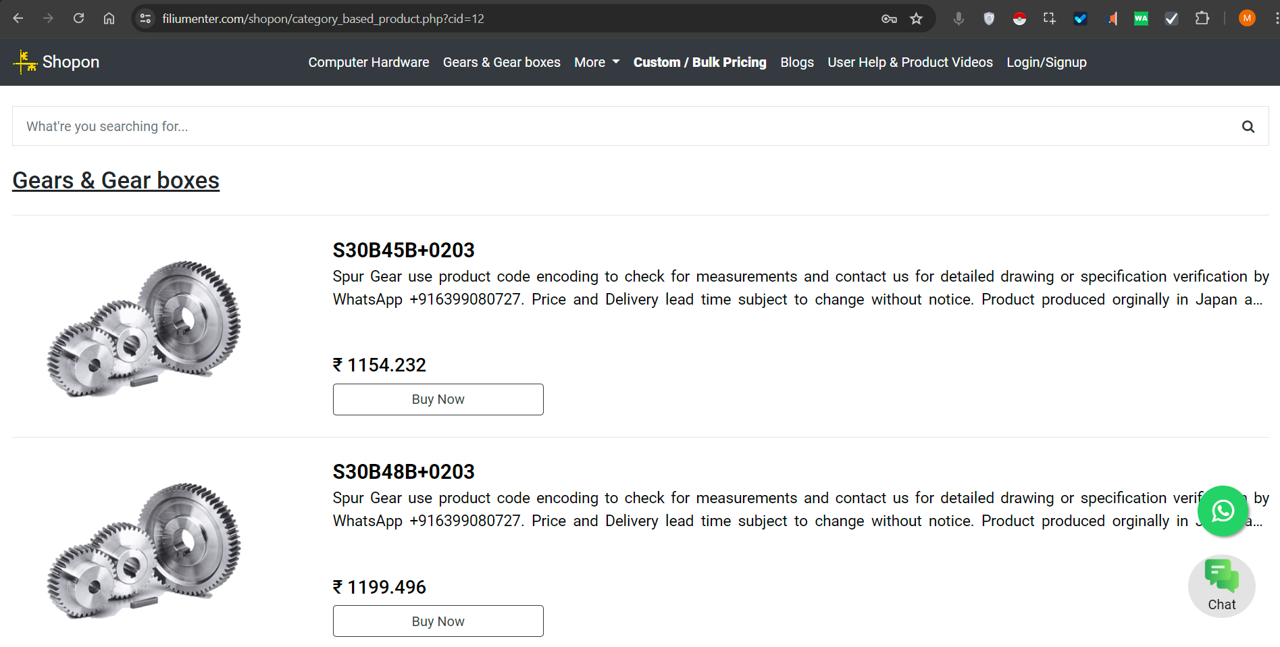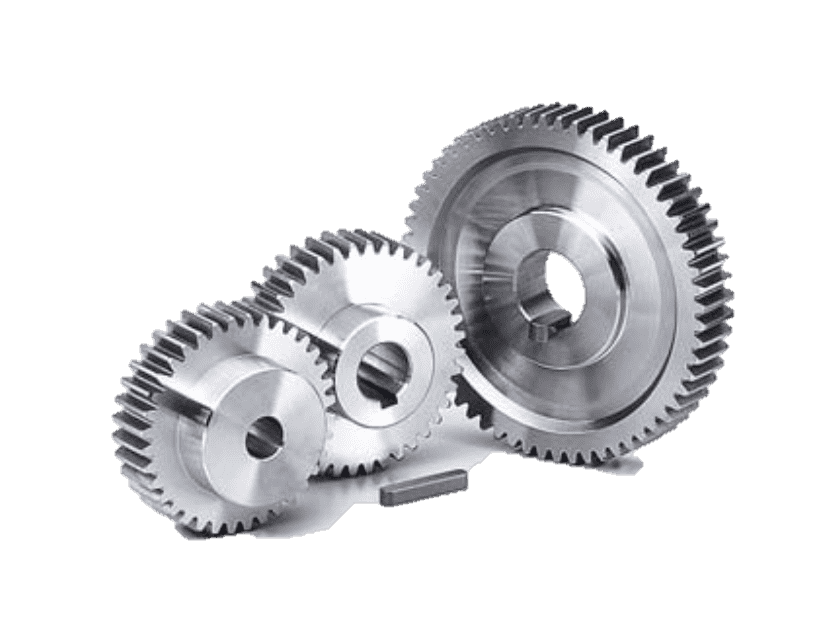Spur Gear Product Guide - Buy online or direct at Filium

What is a gear?
A gear is a rotating machine part having cut teeth, or cogs, which mesh with another toothed part to transmit torque. Gears can change the speed, direction, and torque of a power source. They are used in various mechanical devices, from simple clocks to complex automotive transmissions.
How are precision gears different from regular gears?
Precision gears differ from regular gears primarily in their manufacturing accuracy, material quality, and application requirements. Here are the main differences:
Manufacturing Tolerances:
- Precision Gears: Made with very tight tolerances to ensure high accuracy in dimensions, tooth profiles, and surface finishes. This reduces backlash and improves the efficiency and reliability of power transmission.
- Regular Gears: Manufactured with standard tolerances, which are sufficient for less demanding applications where high precision is not critical.
Material Quality:
- Precision Gears: Often made from high-quality materials such as alloy steels, stainless steels, or specialized composites to ensure durability, strength, and resistance to wear and corrosion.
- Regular Gears: Made from standard materials that may not have the same level of strength or wear resistance.
Application Requirements:
- Precision Gears: Used in applications where exact positioning, minimal noise, and high efficiency are crucial, such as in aerospace, medical devices, robotics, and high-precision machinery.
- Regular Gears: Suitable for general-purpose applications like automotive systems, industrial machinery, and consumer electronics, where the demands for precision are not as stringent.
Manufacturing Processes:
- Precision Gears: Often produced using advanced manufacturing techniques such as CNC machining, grinding, and honing to achieve the desired precision.
- Regular Gears: Typically produced using conventional methods like casting, stamping, or standard machining.
Performance Characteristics:
- Precision Gears: Exhibit lower noise levels, higher load-carrying capacity, greater efficiency, and longer service life due to their superior manufacturing quality and tighter tolerances.
- Regular Gears: Provide adequate performance for less demanding applications but may have higher noise levels, lower efficiency, and shorter lifespan compared to precision gears.
Where are Filium Supplied Gears Manufactured?
Filium gear manufacturing based is located in Japan producing a wide range of gears including spur gears, helical gears, bevel gears, and custom gears to meet specific requirements. Filium is an exclusive partner to KG Gears OEM for a majority of Gears supplied by Filium. Filium engineering team takes extraordinary care of our customers across India and across the world for their stock and custom gear design requirements. We support clients from around the globe from prototyping to mass production over the years. Filium has been a prominent gear supplier since 2018.
What applications use Filium precision spur gears?
Filium Precision spur gears are used in applications that require high accuracy, low noise, and efficient power transmission. Some common applications include:
Aerospace:
- Aircraft instruments
- Satellite positioning systems
- Flight control systems
- Space exploration equipment
Medical Devices:
- MRI machines
- Surgical robots
- Dental equipment
- Laboratory analysis devices
Robotics:
- Industrial robots
- Service robots
- Autonomous vehicles
- Robotic arms and manipulators
Automotive:
- Transmission systems
- Power steering systems
- Fuel injection systems
- Electric vehicle drivetrains
Precision Machinery:
- CNC machines
- Printing presses
- Optical instruments
- High-precision clocks and watches
Consumer Electronics:
- Cameras and camcorders
- Printers and copiers
- Audio and video equipment
- Hard disk drives
Industrial Equipment:
- Conveyor systems
- Packaging machinery
- Textile machinery
- Automated assembly lines
Renewable Energy:
- Wind turbines
- Solar tracking systems
- Hydroelectric turbines
Precision spur gears are essential in these applications to ensure smooth operation, high reliability, and longevity of the equipment.
Related Products

What characteristics of precision spur gears are important for quality and long life?
The quality and longevity of precision spur gears depend on several key characteristics:
Material Quality:
- High-Strength Materials: Use of high-quality materials such as alloy steels, stainless steels, and specialized composites enhances strength and wear resistance.
- Heat Treatment: Proper heat treatment processes, like carburizing and nitriding, improve surface hardness and fatigue resistance.
Manufacturing Precision:
- Tight Tolerances: Manufacturing with tight tolerances ensures accurate tooth profiles and dimensions, reducing backlash and increasing efficiency.
- Surface Finish: Smooth surface finishes decrease friction and wear, contributing to quieter operation and longer lifespan.
- Advanced Manufacturing Techniques: Use of CNC machining, grinding, and honing ensures high precision and consistency.
Design Accuracy:
- Accurate Tooth Profiles: Precise tooth geometry ensures proper meshing and load distribution, reducing stress concentrations and wear.
- Load Distribution: Optimized design for even load distribution across gear teeth prevents premature wear and failure.
Lubrication and Maintenance:
- Proper Lubrication: Adequate and appropriate lubrication minimizes friction and wear, extending gear life.
- Regular Maintenance: Scheduled inspections and maintenance help identify and address issues before they lead to gear failure.
Environmental Resistance:
- Corrosion Resistance: Use of corrosion-resistant materials and coatings protects gears in harsh environments.
- Temperature Tolerance: Gears designed to operate within specific temperature ranges prevent thermal degradation and maintain performance.
Load Capacity:
- High Load-Bearing Capacity: Gears designed to handle specified loads without deformation ensure reliability and longevity.
- Fatigue Resistance: Materials and designs that resist fatigue under cyclic loading conditions prevent gear failure over time.
Noise and Vibration Control:
- Low Noise Operation: Precision in manufacturing reduces gear noise, which is crucial for applications where quiet operation is necessary.
- Vibration Minimization: Proper design and alignment minimize vibrations, which can otherwise lead to gear wear and failure.
By focusing on these characteristics, precision spur gears can achieve high quality and extended service life, making them suitable for demanding applications in various industries. Contact our Central WhatsApp support number at +91-6399080727 to discuss your requirements or simply submit your request online via Shopon.
